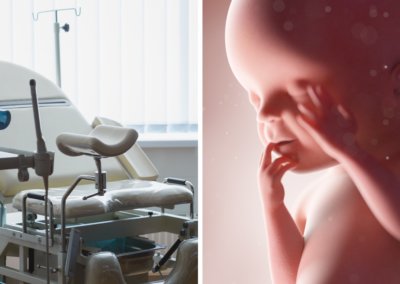Over 600 medical professionals have called for an end to ‘DIY’ home abortion services, as a BBC polling shows significant proportion of women report being given abortion pills without their consent
The open letter, signed by over 600 medical professionals publicly requests that the ‘at-home’ abortion schemes in England, Scotland, and Wales are revoked with immediate effect.
In late February, the Department of Health and Social Care confirmed that the temporary measure that allowed ‘DIY’ at-home abortions to take place during the COVID-19 pandemic will be wound down, with a return to the pre-pandemic safeguard of an in-person appointment as part of the abortion process from 30 August 2022.
The Government also announced the results of a consultation on whether ‘DIY’ at-home abortion provision should be ended, which showed that 70% of submissions to the consultation supported ending the temporary policy immediately.
BBC POLLING
A Savanta ComRes poll commissioned by the BBC and reported on this morning, shows that 5% of women aged between 18 and 24 and 4% of women aged between 25 and 34 had been given “something (tablets/substance) to cause an abortion” without their consent.
The BBC poll shows that 0% of women in Northern Ireland, where a woman is required to have an in person consultation and take the first set of pills in a medical abortion in person, reported being given “something (tablets/substance) to cause an abortion” without their consent”.
The polling also shows that 15% of women experienced “pressure to terminate a pregnancy” when they did not want to and 5% of women experienced “physical violence with intention to force a miscarriage / end a pregnancy”.
Prior to ‘DIY’ abortion being allowed during the pandemic, women were given the first set of abortion pills in a medical abortion in person, making it much harder for third parties who are seeking to give a women an abortion pill without their consent to get access to abortion pills.
A nationwide undercover investigation found evidence of abortion providers not carrying out basic checks before sending abortion pills by post. In the investigation led by public health consultant Kevin Duffy, a former Global Director of Clinics Development at Marie Stopes International, all 26 requests by volunteers were successful in acquiring mifepristone and misoprostol using false names, dates of birth, and gestational dates.
CONCERNS FROM MEDICAL PROFESSIONALS
Respondents to the Government’s consultation from Clinical Commissioning Groups (CCGs) and NHS trusts reported that “the temporary measure had increased presentations to emergency departments and that other general hospital services, such as ambulance services, had been impacted by the temporary measure”. These groups also “highlighted concerns about increased safeguarding risks – for example, for people with learning disabilities”.
A number of concerns were raised around the safety of the woman, especially with regards to “women being coerced into an abortion when they are not physically being seen in a service”, as well as innacurate assessments of gestation and “the absence of support particularly in relation to management of emotional distress”.
Concerns were also raised about staff being “less able to ensure that safeguarding [was] being adhered to and women were not being placed at the centre of care”.
The report also outlined: “Safeguarding organisations responded that there are very significant advantages for all those aged under 18, and those under 25 who are care experienced, to be seen at least once for an assessment by a clinician. They also expressed the view that face-to-face clinical assessment reduces the risk from those who sexually exploit children, manipulate the system or force their victims to obtain an abortion”.
GP POLLING
Serious concerns around ‘DIY’ home abortion schemes from medical professionals schemes have been mirrored in polling of GPs from Savanta ComRes.
The polling showed that 86% of GPs surveyed across the UK were concerned about women having a medical abortion past the legal limit of ten weeks’ gestation. Concern was highest among female doctors (91%).
The polling also showed that 6 in 7 GPs were concerned that the policy could see more women being coerced into abortion and 86% were concerned that women were at risk of being coerced into abortion by a family member or partner.
Dr Calum Miller, medical doctor and Research Associate at the University of Oxford said: “The best way to recognise victims of coerced abortion is through an in-person consultation. Medical professionals know it, the government knows it, and abortion providers themselves know it.
Coerced abortion is a serious human rights abuse that the government and doctors have a duty to prevent, not facilitate. It’s time we put women’s safety before convenience. It is vital thatwomen having abortions should be seen in person for at least a physical examination.
This is a critical safety measure to check the gestation of the pregnancy and assess for contra-indications and ectopic pregnancies. In a country aiming to provide women with world-class healthcare and not merely the minimum standard, ultrasound should also be routine. We should not be failing women by eliminating the checks we have in place to put their safety first.”
PUTTING WOMEN AT RISK
Carla Lockhart MP for Upper Bann said: “Not only were these permissions granted by the Government without adequate parliamentary and public scrutiny, but they are putting women’s physical and mental health at risk”.
“Given that seven per cent of British women report having been pressured into an abortion by a husband or partner, it is greatly concerning that the Department of Health and Social Care saw fit to remove the requirement of a routine in-person consultation before an abortion”.
“Lack of sufficient ID checks over the online consultation process also poses the threat of pills being falsely obtained for another person, which raises particular concerns regarding cases of underage sexual abuse and trafficking”.
Scott Benton MP for Blackpool South said: “The debate over at-home abortion is not a philosophical debate about abortion itself, it is about ensuring women are safe. Without mandatory in-person consultations to verify gestational age and diagnose ectopic pregnancies via ultrasound, a range of complications can occur”.
“It is therefore unsurprising that such a strong number of medical professionals have come out in favour of ending this extremely dangerous practice”.
Spokesperson for Right To Life UK, Catherine Robinson said: “Given that the current temporary provision continues to put women at risk, we are disappointed that the provision has not been ended on its planned end date of 30 March 2022, but we do welcome the Government’s decision to ensure that women get an in-person appointment before having an abortion and make sure no more women are put at risk by the temporary provision from 30 August 2022”.
“At-home abortion schemes have been linked to a series of scandals where women have been put at risk by the removal of an in-person consultation”.
“A study released in November 2021 suggested that more than 10,000 women had to receive hospital treatment following the use of medical abortion pills in England between April 2020 and September 2021”.
“By removing a routine in-person consultation that allows medical practitioners to certify gestation and recognise potential coercion or abuse, ‘at-home’ abortion has presented serious risks to women and girls in abusive situations. It has allowed severe complications to occur, as well as abortions beyond the legal limit, as abortion providers currently cannot ensure the pills are taken by the intended individual within the appropriate time frame”.
“Polling in England shows the overwhelming majority of women and GPs surveyed were concerned by the possibility of pills being falsely obtained for another person, and by women having medical abortions at home beyond the legal limit. Previous polling has revealed that 92% of women in Britain agreed that a woman requesting an abortion should always be seen in person by a qualified doctor”.












